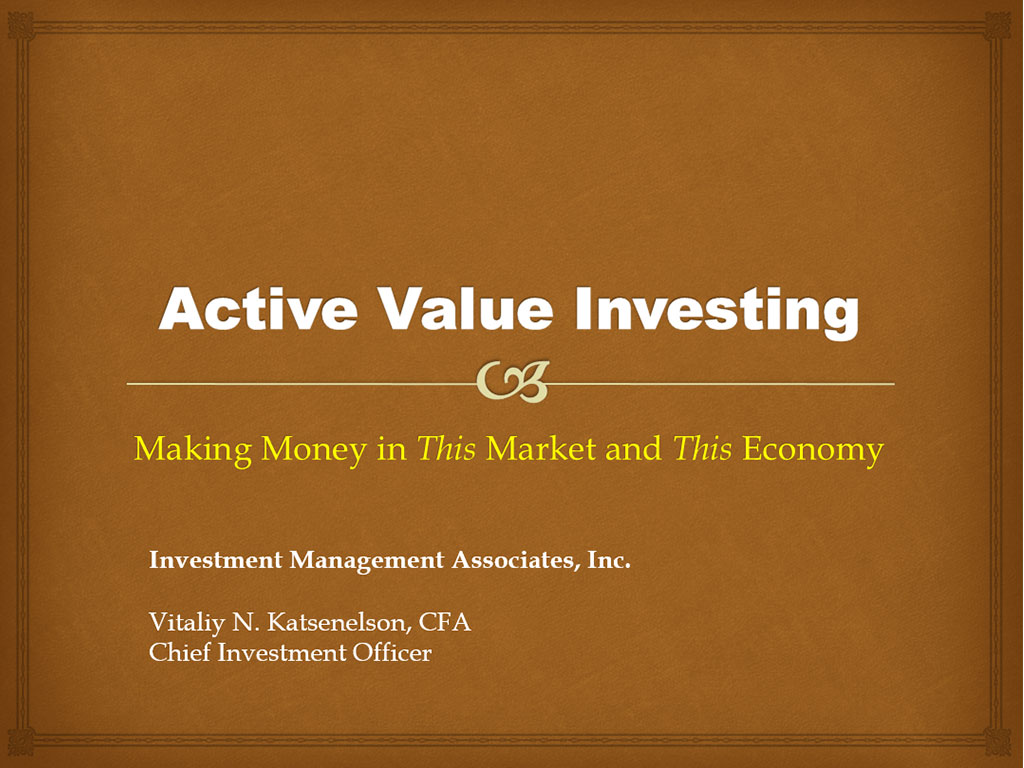Mark Twain said, “To a man with a hammer, everything looks like a nail.” To a Fed – an institution employing an army of economists and academics – everything looks like an economic problem that needs to be quantitatively eased. But the Fed is killing the economy.
Undermines confidence
Sir Alan Greenspan, who, after he left the Fed, suddenly turned into a rational and comprehensible person, was on The Charlie Rose Show in June, where he said that businesses don’t want to invest because they are concerned about the future. I agree.
Ironically, it is the Fed’s intervention in the free market and arbitrarily setting short- and long-term interest rates at insanely low levels that is responsible for this uncertainty, as it enables and propagates speculation, not investing (two distinctly different activities) and erodes confidence about the future. Usually, in investing, liquid capital is turned into illiquid by committing it to a higher, more productive long-term use. Ability (read: confidence) to forecast after-tax cash flows and discount rates (which are a function of interest rates/inflation/risk premium) is the key here. However, these concepts are foreign to speculators who are indifferent to what asset they hold (junk or quality). Their time horizon is much shorter, and they are just looking for a greater fool to unload their stuff on. The next tick in price is the only variable that matters.
Speculators are the ones driving stock prices up (and down) in the short run, but they leave as fast as they arrive. It is the investors who stick around, but because of Bernanke, they choose not to come.
Declared a war against the wrong statistic
The health of our economy has been measured based on the wrong statistic: unemployment. It’s a political number that everyone pays very close attention to, but it’s not as important to the health of the economy as it appears to be. Statistically, 9% unemployment is high, but most of the unemployment is in low-paying jobs. Unemployment among people with a bachelor’s degree is 5.4%, while among those who don’t have a high school diploma is almost 15%. Workers with a bachelor’s degree make almost three times more than those who didn’t graduate from high school. Thus, the impact of unemployment on the economy is a lot less pronounced than the headline number may indicate. The trend in unemployment is more important than the number itself.
Fixing unfixable
I feel for the people who don’t have a job, but the Fed and the government are trying to fix a problem that only time can fix. After all, the bulk of current unemployment is structural, it is not caused by too little money in the economy or interest rates being too high – the Fed took care of that, and it still didn’t make a difference. The 9% unemployment is caused by overcapacity in the housing sector (Mr. Greenspan, in Charlie Rose’s interview, agreed with that point), which took two-thirds of a decade and a lot of bad loans to create and thus will take time and population growth to self-heal.
Focusing on the wrong statistic and using the government’s balance sheet (i.e., debt) to cure the incurable is dangerous. The statistic the Fed should worry about is the one it worries about the least, as it feels it can control it. Yes, interest rates. They are more important for our economy than unemployment: as our debt grows, interest payments are becoming a greater portion of the federal budget; thus our budget deficits will become more interest-rate-sensitive, which in turn will impact tax rates. The housing market is tethered to interest rates as well. Having taken short- and long-term interest rates to all-time lows, the Fed was not able to lift the housing market – we simply got too addicted to low interest rates. However, if interest rates go up to levels we have not seen in a few decades, they will tank the housing market.
The Fed is desperately trying to mess with interest rates through QEs, but at some point it may lose control over them. Recently we saw yields of Italian bonds jump to 6% – and Italy is a first-world nation. The market is more powerful than the Fed and is not stupid. It will not let the US government borrow at first-world-nation rates while behaving as a third-world country (like the ones we used to preach to about how to run their government finances). Also, China and Japan, the largest foreign holders of US Treasuries, have their own sets of problems and may have a lot less demand for our less-than-excellent debt in the future.
Until we hit the wall we are not willing to take the needed pain, i.e., significant budget cuts across the board (we simply cannot afford the government we have) and some higher taxes. Unfortunately we are so impressed with the Ivy League vocabulary the Fed heads use and are so scared that our economy will cease to exist without the Fed’s help (i.e. QEs), that we play along. But our economy really needs to get off Fed (and government) steroids and start functioning on its own. However, judging from Bernanke’s latest testimony to Congress, that is not likely to happen, as the Fed will use the US economy as a laboratory for “untested” measures, which will go down in history as QE3. Prepare for higher interest rates and higher inflation.









0 comments